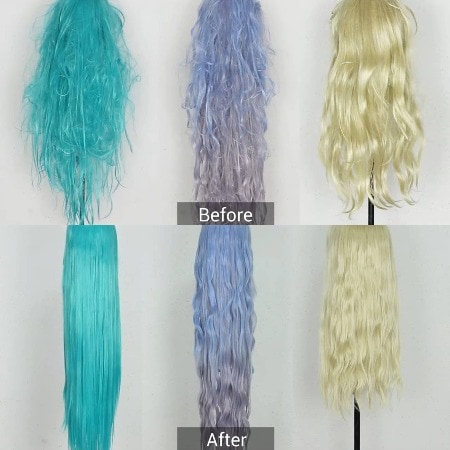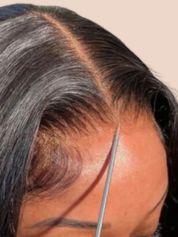
You May Like
Popular posts
How to Detangle a Synthetic Wig and Keep It Looking Flawless
Picture this: you just came back from an epic cosplay event or a long day outdoors, and your once-pristine synthetic wig is a nest of tangles. Before you mourn its "ruined" state, take a breath—those knots aren’t permanent! With a few tools and our step-by-step guide, you can rescue your wig from chaos and keep it party-ready for your next adventure.

Source: YouTube
Essential Detangling Tools and Products
To effectively detangle your synthetic wig, you need the right tools and products that are gentle yet efficient. Having these on hand will make the process smoother and help maintain the wig's quality over time.
✅ Wide-tooth comb
✅ Wig detangling spray or conditioner
✅ Soft, clean towel
✅ Scissors (for trimming stubborn tangles, if necessary)
✅ Wig stand or mannequin head (optional)
✅ Hair Clips or Sectioning Clips
Step-by-Step Guide to Detangle a Synthetic Wig
Detangling your synthetic wig doesn’t have to be a daunting process if you follow these detailed steps. With the right tools and techniques, you can restore your wig's smoothness and preserve its longevity. Here’s how I do it:
Step 1: Divide the Wig into Sections
Divide the wig into small, manageable sections using hair or sectioning clips. I always recommend working from the bottom up — this prevents the tangles from bunching together and makes the task much easier. Secure the upper portions out of the way while focusing on one section at a time.
Step 2: Apply Wig Detangling Spray or Conditioner
Lightly spray a generous amount of wig detangling spray or conditioner onto the first section of the wig. This helps loosen the tangles and reduces the risk of pulling or damaging the fibers. I’ve found that applying the product evenly and letting it sit for a minute works wonders.
Step 3: Use a Wide-Tooth Comb
Start combing the wig gently, beginning from the tips and gradually working your way up to the roots. Always hold the wig fibers securely near the point where you’re combing to prevent unnecessary strain on the strands. Be patient here – it’s better to use small, careful strokes rather than forcing the comb through tough tangles.
Step 4: Trim Stubborn Tangles (if necessary)
If you encounter a knot that refuses to budge, don’t keep forcing it. Instead, use a pair of scissors to carefully snip away the tangled strands. I only resort to this method as a last resort to avoid unnecessary trimming, but it’s crucial for preserving the overall look of the wig.
Step 5: Gently Pat Dry and Style (Optional)
Once all the tangles are removed, use a soft, clean towel to gently pat the wig dry if you used a spray or conditioner that left it damp. Avoid rubbing, as this can cause additional frizz. You can then proceed to style the wig to your liking, ensuring it looks as good as new.
By following these steps, you can keep your synthetic wig in top condition and significantly extend its life.
Here is a how-to video for your reference, which mainly introduces two methods for detangling synthetic wigs. In addition to what I introduced above, you can also soak the wig directly in hot water with fabric softener and then style it with a straightener (caution: this may cause damage to the synthetic wig fibers).
Prevention Tips to Keep Your Synthetic Wig Tangle-Free
Let’s be honest: detangling a wig is nobody’s idea of fun. Over the years, I’ve learned (sometimes the hard way!) that preventing knots is way easier than fixing them. Here are my tried-and-true habits to keep synthetic wigs smooth, whether you’re wearing them daily or saving them for special occasions.
1. Brush Before You Wear It
Many people often skip this step to save time, until I noticed that wigs would tangle faster if I didn't do it. Now, I always comb my wigs lightly with a wide-tooth comb before putting them on. This removes any hidden tangles and aligns the fibers.
2. Store It Properly
Throwing your wig on a dresser? Big mistake. Early in my wig journey, I ruined a curly synthetic piece by leaving it loose—it knotted overnight. Now, I use wig stands or mannequin heads. For travel, I lay it flat in a silk-lined storage bag (a cotton pillowcase works too!).
3. Wash Smarter, Not Harder
Overwashing strips the wig’s coating, making fibers rough and tangle-prone. I wash my synthetic wigs every 8-12 wears, using cold water and wig-specific shampoo. After rinsing, I gently squeeze (never twist!) excess water use a towel, and let it dry on a stand. Trust me, patience here saves hours of detangling later.
4. Protect It During Activities
If you’re dancing, hiking, or cosplaying in windy conditions, a little prep goes a long way. I spritz my wig with a silicone-based detangling spray (avoid alcohol-heavy formulas!) and braid or loosely tie longer styles. For curly wigs, I’ll lightly finger-coil sections to keep curls defined and less likely to matte.
Achieve Perfect Wig Maintenance
Detangling a synthetic wig might seem daunting, but with the right approach and tools, you can bring even the most tangled wig back to life. Wondering if more care tips are best for your wig? Explore our professional blogs on wig care.






















































Submit Your comment